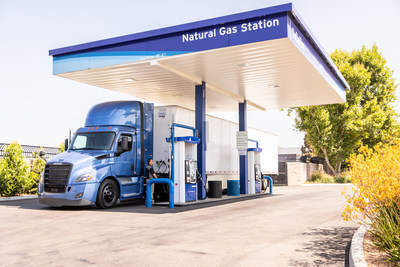Southern California Gas Co. (SoCalGas) has announced that it will start using renewable natural gas for the first time at the 25 utility-owned natural gas vehicle fueling stations across its service territory.

Image: SoCalGas will soon begin using renewable natural gas for the first time at its natural gas vehicle fueling stations. Photo courtesy of Southern California Gas Co.
It will also use the renewable natural gas at six fueling stations in the San Diego area.
Last month, the utility received approval from the California Public Utilities Commission (CPUC) for a pilot program to purchase the renewable fuel and capture the additional environmental credits generated. Today, it published a Request for Offer (RFO), and expects to complete gas purchase agreements in the near future.
Renewable natural gas (RNG) is produced from the methane generated in landfills, wastewater treatment plants, food processing and dairies and depending on its source, can be low-carbon or in some cases, even carbon-negative. It can be used to fuel trucks and buses, to generate electricity, to heat homes and businesses, and to cook. Capturing the methane from these waste sources and using it for fuel has two benefits: It keeps methane, a greenhouse gas, from entering the atmosphere and contributing to climate change, and it reduces the use of traditionally-sourced natural gas.
Because renewable natural gas can be stored and delivered through the existing natural gas infrastructure, SoCalGas can help California reduce greenhouse gas emissions and meet the state’s renewable energy and air quality goals in a cost-effective way. In addition, unlike solar and wind energy, renewable natural gas is available when needed—day or night.
“Using renewable natural gas at our natural gas fueling stations will help clean the air for Southern California communities and support the state’s clean energy future,” said Sharon Tomkins, SoCalGas’ vice president of customer solutions and strategy. “SoCalGas will continue to work to increase the use and production of renewable natural gas, meeting consumer preferences and helping to achieve state’s climate and air quality goals while efficiently using existing infrastructure.”
“Using renewable natural gas to fuel near-zero emission heavy-duty trucks in Southern California will help solve our air quality problems while lowering climate impacts,” said Dr. Joseph Lyou, President and CEO of the Coalition for Clean Air and a member of the South Coast Air Quality Management District Governing Board. “It’s good to see SoCal Gas taking the lead on this renewable natural gas project.”
“The Antelope Valley Air Quality Management District has long partnered with SoCalGas to promote natural gas in transportation, and their fueling station in Lancaster,” said Marvin Crist, chairman of the governing board for the Antelope Valley Air Quality Management District. “Adding renewable natural gas to the mix makes natural gas-fueled transportation even more friendly to our air quality and environment.”
“Athens Services is committed to our environment and the communities that we serve, and our CNG vehicles that collect municipal waste are just one of those examples,” said Gary Clifford, executive vice president for Athens Services, a Southern California waste collection and recycling company. “While our vehicles are fueled with renewable natural gas at our hauling yards, we applaud SoCalGas for offering opportunities for more natural gas vehicles to also use this renewable clean-air fuel.”
“Natural gas trucks can reduce smog-forming emissions by more than 90 percent compared to diesel trucks which can help create cleaner and healthier communities,” said Anabella Bastida, executive director of the Council of Mexican Federations in North America (COFEM). “Our WECAN effort is focused on educating our South East Los Angeles community members to address the public health crisis caused by air pollution. We need technology that is available and reliable that will help us clean the air now! Renewable natural gas is an immediate solution. We hope that the increased availability of this renewable fuel will encourage more trucking fleets to switch to natural gas to create a cleaner air for our families in California.”
Renewable natural gas is an important tool for reducing emissions from California’s transportation sector, which is responsible for about 40 percent of the state’s greenhouse gas emissions and more than 80 percent of its smog-forming (NOx) emissions. The latest generation of natural gas engines for heavy duty vehicles can reduce smog-forming emissions by more than 90 percent compared to the cleanest heavy-duty diesel trucks. When these ultra-low emissions natural gas trucks are fueled with renewable natural gas, greenhouse gas emissions are reduced by at least 80 percent.
Near zero emission natural gas trucks are helping achieve the state’s greenhouse gas reduction goals and clean the air around California’s transportation corridors. Because of this, California provides incentive funding to help trucking fleets transition to renewable natural gas. Close to 70 percent of natural gas fleets in California are fueled with renewable natural gas.
Source: Company Press Release
